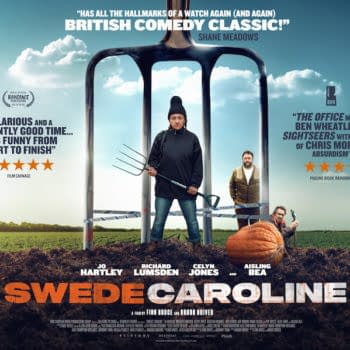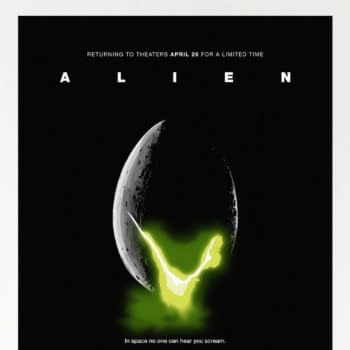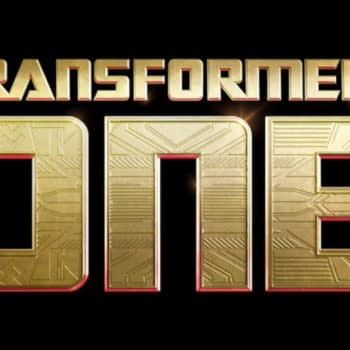Posted in: Movies, Recent Updates | Tagged: entertainment, film, indy filmmaking, marketing
Film Schooling – Insider Insights On Indy Filmmaking: Selling Your Film…Are You Ready?
By Chris Hood
(This is Part Twenty Three of an ongoing series to help educate aspiring filmmakers on the process of making their first film. Previous articles in this series can be found at BleedingCool.com and MovieIndustry.com)
Parts: 1, 2, 3, 4, 5, 6, 7, 8, 9, 10, 11, 12, 13, 14, 15, 16, 17, 18, 19, 20, 21, 22
Happy days! Your film is finally done and it's time to try to sell it, right? Not so fast, Kubrick! The next chapter in this epic series will deal with how to actually going about reaching out to distributors and sales agents, but before we do this, I want to be sure you're actually ready. A surprising number of people aren't when they start pimping their film. I'm here to save you from the minefield of inexperience.
First, let's confirm that the film is actually done. I've warned in previous articles why you never, ever want to show an unfinished project to a distributor or sales agent. In fact, if you're not looking for constructive criticism that can/may result in changes to the project, never show an unfinished film to anyone. So now that it's done and no one has heard or seen much of anything about it, you'll be able to hit the scene with a fresh piece of meat. This is important.
You can start teasing a project months in advance, but the value in this is debatable. The nature of this "tease" should never be any more than a trailer and/or poster. Some more detailed info can be made available, but you'll be wasting your time. I prefer to wait until a film is done and ready for delivery. A buyer will never be more interested than the moment they are first exposed to the project and like what they see. They may remember it 3 or 6 months later, but their enthusiasm, at best, will have waned minimally. Their anticipation won't be building, so the benefits of this advance tease are negligible. I advise to wait until it's all good to go.
Your trailer should never be more than 2 minutes. I have people write me about their projects (either finished or not, but usually not) and include a link to a "preview." No distributor sells movies with a preview, so we have no interest in watching them. Our buyers want to see trailers and, if that's promising, they'll watch the whole movie (we hope they make it all the way through it). No one wants to see just 20 minutes of a film except for the people involved in making it. Yeah, I get it – you get excited when a chunk of the film is done and starts to feel like a "real" movie. The problem is, the rest of the world isn't excited. The only thing conclusive a 20 minute preview does for me is it tells me I don't want your film. It can't tell me I want it. It can only tell me I'd be willing to watch more if/when the filmmaker actually gets around to providing it (and once my enthusiasm has waned). Upside – I'll watch the film when you send it over. Downside – I'm done, don't bother sending the full film when it's finally ready. So where's the benefit to you? There isn't one. Use your filter. No previews!
Have a killer trailer, usually two minutes, but it could possibly be a bit shorter. Don't make it longer! If they can relay the story of Lord of the Rings, Titanic or Being John Malkovich in two minutes or less, it can certainly be done with your film. Trailers themselves are an art form, so make sure the person doing yours knows how it's done. A trailer is not a two minute version of your film. I could write an entire article about trailers, but this is all you're getting from me on this. The trailer and poster will be the things that get your film watched or dismissed. They may even be the things that get your film picked up!
When it comes to the poster, this is where I see the greatest tragedies. Your poster has to be done by a graphic artist. Period. There are no exceptions. A shocking number of indy filmmakers have a poster which is clearly made by themselves or a friend who likewise has remedial Photoshop skills. Nearly every low-budget film that comes to us has a bad poster. A shocking number are terrible. I'll usually overlook this and take a look at the trailer, but there have been times when the poster is so weak, so unprofessional, I dismiss the film outright and don't even bother. And the reality is, if you don't have enough sense to have a professional looking poster/box art for your film, you're probably clueless about pretty much everything else related to making a selling a film as well. I've seen bad posters for films that could be marketable (with a better poster). I've never seen a remedial, unprofessional poster and have the film end up being "great" or even "good."
Now, understand, there are "bad" posters for studio films. I'm not talking about bad creative decisions, like most of the posters for John Carter. Those were tragic, but they were professionally done. I'm talking about artwork that you'd expect to see for a high school video production class project. Low resolution, remedial graphics…something you know you would never see on a video store shelf (at least, back when there were video stores). If you're using a screen capture from the film, your poster sucks. If you're not hiring a professional graphic artist, you poster sucks. If you're quoting someone no one's ever heard of, your poster sucks. With a little effort, you can get a professional to do a killer poster for $100-$300. The poster can be as important as the film itself. No bullshit! I've sold films based on the poster without the buyer even watching the film.
One of the films my company handles came to me with the title "Broken Springs: Rise of the Undead Zombie Bastards." The poster was weak. I picked up the title just before the American Film Market and didn't have time to make any changes. I didn't make a single sale. After the market, I hired an artist to come up with a new poster and changed the name to "101 Zombies." Everyone loved the poster. Everyone wanted to see the film. To date, it's our best selling micro-budget film. Same movie, but a different title and poster. That's it.
Another piece you need to have in place before you reach out to distributors is an online screener. The days of mailing out DVDs is over. It's been more than a year since I've had someone request a DVD or Blu Ray, with the exception being for 3D which obviously doesn't stream well on computers. You need to have your film online and ready to view the moment a prospective distributor or buyer wants to check it out. Generally, that link accompanies the initial query letter, so I can be watching your film within minutes of first learning about it, seeing the poster and checking out your super-awesome trailer.
So what's the best way to go about offering an online screener? The best thing you can do is have an actual website set up for your film. A professional website and slick poster and trailer at a dedicated URL smacks of having your shit together. There are a number of places to host your videos, but avoid anything that has a hosting site watermark on the video (or trailer). Don't use YouTube (unless they offer a way to embed your video elsewhere without displaying their watermark). Spend a few extra bucks for 'premium' service to avoid that watermark at all costs. Always keep in mind, the more professional your film, your presentation, your poster, your trailer, and even you come across, the most money it will seem was spent on the film and how much you spent on the film will have a direct relation to what you get offered if someone wants to handle it. I can't emphasize this enough.
Your screener should be in the highest resolution possible. It should be HD. Depending on which services you're using and the skills of the people helping you put it together, it's ideal if you can offer both an HD and an SD option. I know certain Vimeo accounts/settings allow for this with the simple click of a butter for HD/SD. Also, you absolutely should have a disclaimer on your film. This should appear a number of times throughout the film, for perhaps a minute at a time, toward the bottom of the frame, but not so low that it could be cropped out. It can be as simple as "For Screening Purposes Only" but can also include a website or phone number. Just keep it simple as it is a (necessary) distraction. There are certainly unscrupulous foreign buyers who can and do rip HD screeners and release those pirated films. It's a relatively low risk proposition for them and they know it. What are the odds you would find out that your film is available on the Taiwanese equivalent of YouTube? And if so, are you going to hire a lawyer in Taiwan to take them to court over it? Probably not…and they know it. Don't even leave that possibility out there. Protect your investment. Don't induce temptation.
If you have a dedicated website, you can load it up with other goodies, like cast and crew bios and behind the scene footage. These don't hurt, but they don't benefit much, either, aside from making the website look more professional and, consequently, make the film possibly look like more money was spent on it. A simple, classy site with good poster and trailer is really all you need.
As you get ready to start shopping your opus, be prepared for people to ask how much you spent on your film. This is one of the most awkward aspects of the business for me, because I'm inherently honest. I don't even like to engage in white lies. If my girlfriend asks me what I think of an outfit, I want to tell her the truth, even if it's negative. Of course, this is much easier if we're shopping before a commitment is made, but once it's bought, you have to weigh the negative costs associated with complete honesty. Being honest about your budget will usually bite you in the ass as well. If a distributor asks how much you spent on your film, and you tell him, it will almost always be used against you. If you're fortunate enough to get an offer with an advance or minimum guarantee, I promise you that offer will be vastly different on a $75,000 film versus a $350,000 film – even if it's exactly the same film. So that becomes the dilemma. I recommend not answering this question. Find a way to skate around it. Distributors are used to filmmakers not wanting to disclose it, but if you're dumb enough to answer it honestly, it can and will be used against you.
The worst possible thing you can do is brag about how little you spent on the film. The guy I wrote about earlier, Keith, was all too eager to tell everyone that he made his film for $6000. Now, no one was going to think he spend $100k on it, but the minute he said that, he blew any chance of advance money. If someone thought he spent $40k or $50k…who knows. I understand that he was proud of what he accomplished on no money. I was impressed, but it was a terrible move to share that. And he was so proud of it, it was up on the IMDB before he even started trying to sell it. No one wants to buy a $6000 film. No one wants to represent a $6000 film.
On this note, don't put a budget online anywhere. Unless you're inflating it considerably, there's no way it can benefit you. I've had foreign buyers ask that I get filmmakers to remove the budget from their films from IMDB because they wouldn't be able to resell it. Some cable companies in Europe will only buy films with a budget that hits a certain threshold. I rep a film that had a budget around $200k. The filmmaker had put the budget at $500k on IMDB. A buyer agreed to buy the film if I got it taken down so he could tell a local pay cable company the budget was three million!
With the death of the DVD screener, we've also seen the death of the press kit. This was a necessary accessory to the screener which has gone the way of the dodo. It was nice to open a manila envelop and see the DVD and accompanying materials. Felt a little like Christmas. I do, on occasion, still get this type of submission. I don't mind it, especially when done well, and it can stand out. I realize it takes more time and money and can be particularly effective if there's a hook involved. My first film, The Casino Job, was several years ago, and when we sent out our packages (before online screeners), we did it up right. The movie is about a group of strippers that rob a casino. Aside from the DVD screener and one-sheet (heavy 8"x10" heavy stock flyer), I included a number of other items including chocolate poker chips, edible gummy dice, a deck of playing cards, stills of the hot leads (which I wouldn't normally bother with, but the girls were hot and dressed in skimpy costumes from the film, so I figured it would help with men checking out the package).
The other "angle" I included was a gift certificate offering a free trip for two to Vegas for the weekend for the company rep that helped secure distribution with his/her company. And all of this worked. There was a lot of interest in our mediocre little film. In fact, we made a deal with upfront money that exceeded our entire production cost. We were profitable before the film was even released. That is the goal, of course, but it's exceptionally hard to accomplish. I did honored the trip to Vegas for two which cost me around $1500, but the owner of the company told me some time later when we met in person that he didn't know anything about the free trip offering at first until after his assistant had finally convinced him to watch and ultimately buy the film. He thought she was pushing it harder than any other project that had come their way because she liked it so much…
I'm not saying you should take this approach, though if you have some kind of "hook", it can only be a good thing. Think about your project from the perspective of the potential buyer. Why should they want to handle it? Will they be able to sell it? What makes it unique? Really put the time and energy into preparing to take your film out before just vomiting it out into the distribution circles.
If you've done your homework and tackled all this preparation professionally, we can talk about getting it to the distributors and sales agents next time around. To be continued…
Chris Hood is a writer, producer and director of such films as "Counterpunch" starring Danny Trejo (a Lionsgate release) and "Dirty Dealing 3D" with Michael Madsen and C. Thomas Howell. He and Jon Schultz own Robin Hood Films, a Las Vegas-based distribution company representing English language films around the world and Chris operates a film blog at MovieIndustry.com. He's also dead sexy. (Mr. Hood denies any involvement in the creation of this mini-bio.)



















